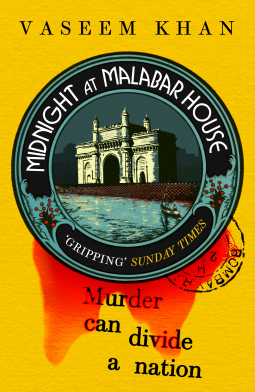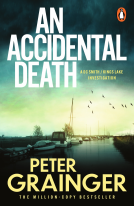
Midnight at Malabar House
by Vaseem Khan
This title was previously available on NetGalley and is now archived.
Send NetGalley books directly to your Kindle or Kindle app
1
To read on a Kindle or Kindle app, please add kindle@netgalley.com as an approved email address to receive files in your Amazon account. Click here for step-by-step instructions.
2
Also find your Kindle email address within your Amazon account, and enter it here.
Pub Date 20 Aug 2020 | Archive Date 31 Oct 2020
Talking about this book? Use #MidnightatMalabarHouse #NetGalley. More hashtag tips!
Description
*** SHORTLISTED FOR THE CWA SAPERE BOOKS HISTORICAL DAGGER 2020, and an INTERNATIONAL BESTSELLER ***
'The leading character is the deftly drawn Persis Wadia, the country's first female detective. She's a wonderful creation and this is a hugely enjoyable book' ANN CLEEVES
'This is historical crime fiction at its best - a compelling mix of social insight and complex plotting with a thoroughly engaging heroine. A highly promising new series' MAIL ON SUNDAY
Bombay, New Year's Eve, 1949
As India celebrates the arrival of a momentous new decade, Inspector Persis Wadia stands vigil in the basement of Malabar House, home to the city's most unwanted unit of police officers. Six months after joining the force she remains India's first female police detective, mistrusted, sidelined and now consigned to the midnight shift.
And so, when the phone rings to report the murder of prominent English diplomat Sir James Herriot, the country's most sensational case falls into her lap.
As 1950 dawns and India prepares to become the world's largest republic, Persis, accompanied by Scotland Yard criminalist Archie Blackfinch, finds herself investigating a case that is becoming more political by the second. Navigating a country and society in turmoil, Persis, smart, stubborn and untested in the crucible of male hostility that surrounds her, must find a way to solve the murder - whatever the cost.
Available Editions
| EDITION | Other Format |
| ISBN | 9781473685468 |
| PRICE | £16.99 (GBP) |
| PAGES | 336 |
Average rating from 50 members
Featured Reviews
 Librarian 431790
Librarian 431790
I hope this is the first in a series and there will be other instalment featuring Inspector Persis Wadia.
It's a well written, engrossing and highly enjoyable story that mixes historical fiction and mystery in an excellent way.
Great character development and story telling, a vivid and well researched historical background.
I learned something new about India and was fascinated by the historical facts and appreciated how well the author deals with issues like colonialism, misogyny and race.
It's an excellent read that I strongly recommend.
Many thanks to the publisher and Netgalley for this ARC, all opinions are mine.
 Jen L, Reviewer
Jen L, Reviewer
For someone like me, whose only real knowledge of Partition came from an episode of Dr Who, this book has been as much a history lesson as it has a thoroughly engaging murder mystery. Set at New Year 1949 into 1950, the story comes at a critical time in the evolution of India, after the atrocities that the division of the country into India and Pakistan created, but whilst India is still finding its feet as a new and soon to be self ruling nation. Working the night shift on New Years Eve, Inspector Persis Wadia receives a call summoning her to home of Sir James Herriot, whose aide has discovered his employer has been murdered. Given the circumstances. the prominence of the victim and the country's desire to start the next chapter of their existence, the pressure is on Wadia and the team of so-called 'misfits' at Malabar House to solve the case quickly.
As india's first, and only, female Detective, the stakes for Wadia are high and yet expectations low. If she succeeds, all well and good. If she fails then it will simply be written off as a failure by an team who have already been sidelined within the police force as a bunch of incompetents and curios. But Vaseem Kahn's latest protagonist, Persis Wadia, is not so easily written off. Whilst many around her believe that she is only there until an offer of marriage comes along and she can return to her proper role in life, she has very clearly got other ideas. She is a truly superb character - principled, determined, tenacious and not one to let things drop no matter what pressure comes to bear from the powers that be, and there is much pressure handed down with regards to the investigation. Wadia has great instincts and although battling the expectations of a very patriarchal society and the cultural norms of India, will not be swayed. She is led by her beliefs and her innate sense of justice rather than logic or science pushing on with her investigation when those around her believe the case is already closed. She is not necessarily the most open of characters, clearly struggling with expressing her emotions or reading those of the people around her, but. I did grow to like her very quickly, and I am looking forward to seeing her develops as the series progresses. She is one very canny and capable cat within a flock of misogynistic and complacent pigeons. It could be a lot of fun.
Almost in direct contrast to Wadia's instinct driven character we have Archie Blackfinch, a British Criminalist who is working with the Indian Police force to help them develop their forensic skills. He is quintessentially British, but also a scientist to the last, and where Wadia just knows something is wrong, Blackfinch is led very much by the evidence. That said, despite his being quite a measured character, he has the capacity to surprise you, and the chemistry between him and Wadia, as mismatched as they are, has been beautifully developed. She leads, he follows, although his trust in Wadia does put him in danger on more than one occasion. It really is fun to watch the clinician being led astray by the eager Inspector.
The backstory to this murder mystery is carefully crafted, the clues well hidden and the list of suspects long. It is a really thought provoking story, reminding readers of the real history of India, beyond the contrasts of the poverty and excess of the country we know today. This is the beginning of modern India's journey, where the imprint of Colonial rule is hard to wash away, and where politics and religion have literally divided a nation. It serves as a stark reminder of the brutality of Partition, of the senseless loss of life that occured due to a difference of faith. The balance between needing to provide the history of India and the current investigation is handled perfectly, neither over working nor over simplifying the horror of what happened, but laying the foundation for the story and the future of the series. There is a real sense of place that develops throughout the story and I was left with a strong impression of the setting and the characters as I read, drawing me even more into the narrative.
There is a kind of Christie-esque vibe to the whole piece, particularly in the reveal of the killer towards the end, wonderfully scripted and with all the key suspects playing their part. It is a brilliant blend of historical thriller and police procedural with a less than typical protagonist that I am really looking forward to seeing develop. Definitely recommended.
 Mystica V, Reviewer
Mystica V, Reviewer
This encapsulated everything I like in books - history, family saga, mystery, detective, a touch of geography and politics of the glass ceiling. All hot topics for me.
The story set in post partition Bombay involves Persis a Parsi (tiny minority in India and in the world actually) eloquent, educated and determined to hold her own in a terribly male dominated profession - the police force in India. The only and first female detective in India but one who has to fight every step of the way to get recognition from her peers, from her superiors and even the public whom she tries to help.
A murder of a English diplomat at the height of a dinner party despite lots of people around, security, his personal servants etc and no one saw or heard anything. The victim was found minus his trousers which added to the mystery and Persis and her team are put in charge of the investigation. Mainly with the reason that if the investigation falls flat, the blame will squarely fall on her shoulders and those of her precinct, all of whom other than her have come there as a result of what is usually called a "punishment transfer" for some misdeed done. Her colleagues all have a chip on their shoulder and some of them are out gunning for her, not liking her status, her position and her confidence.
Going back and forth from the victim's mansion and his coterie of domestics to the far outskirts of Amritsar and the Punjab and coming back again the story winds around with a sad ending. Not the ending that was envisaged but one which sought to cover political ills in a system and one where everyone came smelling of roses. Persis is not happy but she cannot endanger the careers of many with her wanting to speak out the truth. A fine enactment of what happens everyday in most countries even today.
I loved the setting, the detailed history of the antagonism which exists and which politicians try to play down, the insistence on one's community, religion and caste so important in not just India but many Asian countries and the deep rooted hatred built up over centuries sometimes not understood by those outside these realms. Beautifully written about and fascinating reading. This was a real winner for me.
 Wendy J, Reviewer
Wendy J, Reviewer
This is the first in a new series by the author of the fabulous Inspector Chopra Mysteries. I love historical fiction, I love mysteries and I love books set in India, so I knew this was the book for me. From the first word, to the last, it did not disappoint. The character of Persis Wadia, is brilliant - a woman in a man's world, she basically does what no one expects her to do. She is dumped on the graveyard shift, where everyone thinks she will basically be kept, and keep herself, out of the way. Persis is having none of it. She is a modern and independent Indian woman and she knows a female police officer can do exactly what a man can do. The mystery is strong and the plot engrossing, leading to me wanting to carry on reading. I was up half the night reading this book. This book is a strong contender in the historical mystery stakes and Vaseem Khan is up there at his sparkling best. I didn't think Baby Ganesh could be bettered but I now know that is not the case. A fantastic historical mystery which everyone should read.
 Reviewer 266180
Reviewer 266180
A Stunning Mystery.....
A stunning mystery combining perfectly and impeccably drawn characters, pinpoint plotting and an incredible sense of place. Persis Wadia, India’s first female detective has her problems but when a momentous case falls to her she must solve the crime. Enjoyable and satisfying.
 Gray W, Book Trade Professional
Gray W, Book Trade Professional
This was my first Vaseem Khan novel and I will definitely be returning for another in this brilliant new series. From the compelling crime to the brilliant (knowingly) Christie-esque denouement, the story whizzed along without leaving the reader behind. Wadia was a great character to ride along with as she battled to make the truth known, despite the interference of her peers and bosses and the setting of newly-independent India is well-written and does a good job of exploring those tumultuous times without letting it overwhelm the central mystery. Excellent work, Vaseem, we WILL meet again.
 Tracey L, Reviewer
Tracey L, Reviewer
This is the first book I have read by Vaseem Khan, although I do have a couple of the Bay Ganesh series sitting on my shelf waiting to be read. This book, set at the start of 1950, as India moves towards independence, is the first in a new series featuring a wonderful character, Persis Wadia. The book is a joy to read for numerous reasons and I really could not put it down.
Firstly, the characters are a delight. I admired Persis enormously, despite her faults, because her idealism, integrity and desire for the truth, despite the consequences, are ideals many of us start life with, but abandon as we get older, I wish we could all retain them. She is also a pioneer, never an easy position to hold, and the challenges she faces are well considered, developed and thought through, and I found myself absolutely urging her on, to beat the system, something so few of us are ever able to do. Blackfinch and Persis’ father and aunt are also well developed characters and I hope we get to meet them again in future books.
The sense of place is extraordinary. I read somewhere that Khan said that he wanted his books to ‘take readers on a journey to India’ and it certainly did that for me. I studied post colonial literature as part of my English degree and learnt a little about partition and the horrors of that period and I feel Khan was able to portray the atrocities of the period, while showing what war can do to ordinary people and the scars it leaves for generations.
In addition, the solution to the murder was unexpected and kept me guessing until the end, which meant that I found it difficult to put the book down. It was a great whodunnit and whilst the clues were there, they only become obvious at the end of the book.
I loved the book, devoured it in about 4 hours and cannot wait for the next instalment. In the meantime I have a date with Inspector Chopra...
Thank you to NetGalley and Hodder & Stoughton for an advance copy of this book, in return for an honest review.
 Rony C, Reviewer
Rony C, Reviewer
An outstanding crime novel set in India going back to 1950
If you are interested in gender issues like the battle of women to find their voices, historical justice issues and crime, this novel is a must. It is also the beginning of women blending into jobs men usually did.
Just after Indian independence, during the Partition, Gandhi has just been assassinated, delightful, and courageous and endearing Persis Wadia becomes the first female inspector of police in India. She is banished into night duty at Malabar House by her male superiors. Just after midnight, she takes a call reporting the murder of Sir James Herriot, an English diplomat still living in India. Unbeknown to her, this case and her determination to uncover the truth, is the point at which her male colleagues have to reluctantly acknowledge her investigative intelligence and ability. Not without immense hardship for Persis.
Most enjoyable for me in the book was the informative aspect to the history of that time in India alongside the emerging role of women in the workplace. Persis central to the story is a lone female in a male-dominated world. She perseveres, ignores attempts to sabotage her and stubbornly moves forward.
All these ingredients mixed together make a deliciously spicy Indian novel.
BonnieK
Elite Reviewing Group received a copy of the book to review.
 Paromjit H, Reviewer
Paromjit H, Reviewer
Vaseem Khan begins a new crime fiction series, a stunning blend of actual Indian history in one of its most turbulent of times, with fiction. It is set in a Bombay and India on the cusp on becoming the largest democratic republic in the world but a nation plagued and divided by religion, fractured amidst the terrors and horrors of Partition, with separation along the Radcliffe line, costing millions of lives and triggering the huge movement of people, Muslims forced to gravitate towards Pakistan and Sikhs and Hindus to India. Amidst this background, the female Parsee Inspector Persis Wadia, is based at Malabar House, where misfits and those who have come to the end of their professional careers are placed. She is on duty when she gets a call from the aide, Madan Lal, from Laburnam House, the home of the important British diplomat, Sir James Herriot, dressed as Mephistopheles, is discovered trouserless, and murdered at his New Year's Eve Party.
Persis, the first woman police officer in India, finds herself plunged into a high profile case that is to test her to her limits, hampered by political interference, colleagues and a public that refuses to accept that a woman can do her job, with some actively wanting to bring her down, facing situations where her orders are ignored. Herriot is far from the good man he is portrayed as, and the suspects come from the circles of the rich and privileged in Bombay and the few remaining British, hardly any of whom are willing to be co-operative. Helped by British criminalist, Archimedes 'Archie' Blackfinch, Persis has to battle with her superiors, including her boss, the Superintendent of Police, Roshan Seth, untangle the lies and deception to uncover corruption, secrets, more murder, and engage in a high stakes gamble to reveal the truth at the end.
Khan creates a terrific protagonist in Persis, idealistic, awkward in her relations with others such as Archie, inexperienced and having to learn on her feet and confront the reality that the truth is often far from what is sought by those in powerful political positions. At home, she lives with her bookshop owning father, still grieving the loss of his wife, Sanaz, unwilling yet to divulge the circumstances surrounding her death to Persis. Aunt Nussie is insistent in her plans to get Persis married and producing children, but marriage will mean having to leave the police, and Persis hasn't worked so hard to get to where she is to let go of her ambitions and ideals so lightly. This is a brilliant read, so informative on British colonial history in India and Partition, exemplified in the characters such as Robert Campbell, steeped in the British mythology of their rule, believing in their superiority and that they knew what was best for everyone else, unable to conceive of any other world order. Looking forward with great anticipation to the next in the series. Highly recommended. Many thanks to Hodder and Stoughton for an ARC.
"That is the true legacy of Partition, The way it has coloured the perceptions of two peoples who were essentially one, the way it continues to serve as a means by which political interests on both sides of the border can employ hatred and prejudice as a means of deflecting criticism of their regimes.
One can only hope that the wounds of history are healed in the fullness of time. Only then might the ghosts of Partition, the millions of dead and missing, find peace."
-Vaseem Khan
Oh my gosh I love how this man writes. He could write brochures and I would read them because they'd be the best brochures out there. So when I saw that he has a new series out [after being wildly disappointed that it wasn't a new Inspector Chopra book, as I ADORE that series and have learned so much about India by reading them], I decided to request the ARC and was thrilled to receive it. And boy was I NOT disappointed. THIS is going to be a great series, I can just feel it.
The setting is Bombay, 3 years after Partition and on the cusp of official Independence for India. Persis Wadia is the first female police officer, and to be frank, she has a huge chip on her shoulder. She is young and eager to prove her mettle in a world that thinks that she doesn't belong and cannot do her job [more than once in this book, she hears "YOU do not belong here" from both her colleagues and from the people she has to interview while investigating the murder - its a bitter pill]. Add that people are willing to lie at any cost, and to cover each other's tracks, and her job gets harder with each day. Aided by a British Forensic Scientist [Archie Blackfinch] - who she isn't sure if she even LIKES, she sets off to solve the murder that lands in her lap on New Years Eve, no matter what. And WHAT a story it is. And right before the reveal, I realized who it was and was shocked. I never saw it coming. It was very satisfying and very well done.
A note here - if you are unfamiliar with India's history, I would highly suggest reading up on the Colonialism of India by Britain and then reading up on Partition and what happened during that time and what it meant for India and its people. Because if you go in with little to no knowledge, you will be spending a LOT of time looking things up because both of those topics are vital to the story. I have read quite a few books about India, set in India or Pakistan and I still learned stuff I didn't know. So I would suggest reading something, even if it is to give yourself a refresher course via Google or Wikipedia.
I highly recommend this book and I am so looking forward for this series to continue.
Thank you to NetGalley and Hodder and Stoughton for providing this ARC in exchange for an honest review.
 Arunaa A, Reviewer
Arunaa A, Reviewer
Vaseem Khan is a pure class writer. Wordsmith and a master at wordplay. The ‘Midnight At Malabar House’ is his best yet. This one swept me off my feet completely because this becomes an entity of its own without any form of shadowing from the Inspector Chopra and Baby Ganesh Agency series. Midnight at Malabar House takes a different atmosphere and the build-up of story took a different turn. The story is centred around a female police inspector, Persis Wardia trying to find her voice in a male-centric police force.
How Khan wrote a whole new murder mystery that distinguishes itself from his previous works is pure magic. Apart from Agatha Christie, I haven’t come across many crime-writers who could accomplish this contrast in their work.
Partition is quite a tricky subject to handle without forming a biased judgement. Khan carries out the entire juxtaposition eloquently to his readers. Argues out the complexities, multitudes and mirror them to his readers is a testament to his well-thought-out work. He wrote as a matter-of-fact of the political hegemonies which were radicalized by religions and greed for power.
I felt he achieved a middle-(battle)-ground in a flashback in Imphal,Manipur where Indian soldiers (INA) backed up by the Japanese army were fighting the Allied forces of British and the Indian soldiers engaged by the English regiment. Indians and Japanese together on one hand and on the other hand were the Indians with the colonial masters. Double whammy crisis that involved gruesome bloodshed and inhumane cruelties carefully handled by Khan in this story.
His finishing touches are so smooth. No loose ends. All tied up to give his readers a perfectly composed transition in his plot that takes you from Bombay to Punjab with hints of Scotsmen, archaic Indian traditions, Nawabs, the Radcliffe line, and a scenic train journey. A little history of the train systems built in India also took its place in the story. This is no cliched colonial hangover plot which we often come across. But a vividly described prose that enables readers to visualize the entire story before your eyes.
Midnight Malabar House has forensic science features, the usage of Locard’s Principle by the sidekick detective and pathologist - one to stimulate the minds of crime-story lovers. Shows the contrasting entitlements reserved for the Bombay elites and the sycophants of Britishers from the soldiers born on Indian soil fighting a war against their own which wasn’t theirs to begin with.
A glimpse of Churchill orchestrating the power play between Jinnah and Nehru, with 2 other characters Mountbatten and Gandhi equally significant in their roles to the entire catastrophe in the subcontinent.
Khan handled the rich versus poor issues, the egocentric minds of the Indian males whom Persis Wardia had to fight against, the once two brothers (Muslims and Hindus) at loggerheads, career nepotism, misogynist predators always after the women, the always vulgar racial disparities the Britishers had imposed on the Indians and the old feudal system displaced by the supposedly progressive democratic government.
I loved the historical features in his story on the British architecture combined with the Portugese roots which evolved into a cosmopolitan Bombay. The religious and geographical trivia of Punjab, Amritsar. Exotic indian jewelleries, glitz, glam and all that jazz. Human sensibilities, truth, justice and ambition, twisted conscience. George Orwell’s ‘Thought Police’, Bhagat Singh’s revolutionary law vision, Isaiah’s philosophy on the righteous, and even ‘Doctor Zhivago’ play their cameo in Khan’s story.
The climax is provocative and flavourful left to the devices of Persis who had no choice but to throw the cat among the pigeons to identify the murderer. One of my favourite lines by Persis is, “Have you ever tried to stop the monsoon?”. Dang! She’s one femme formidable.
This is a surreal movie experience in a book. I deliberately read it slowly as I did not want it to end so soon. Because the story was too good. He has written prolifically on the undercurrents of corruption, warped mentality, social class prejudices, political expediency, malleable justice that are often exploited by the rich and the powerful. Each step he takes to solving the crime is carefully layered. I’ve truly fallen in love with his writing. I read from cover to cover. His heartfelt note at the end is a reminder that we have to rise above hatred if you want to go into history.
This new series of his is a sure blockbuster. Vaseem Khan proves himself again and again, he is a true class apart. You are in for an entirely sensually riveting crime thriller. Irresistibly ambrosial and I could sum it up with his signature line in ‘Midnight At Malabar House’ - “By a pool of nectar, at the shrine of the sixty-eight”.
Thank you NetGalley and Hodder & Stoughton for this ARC copy.
#MidnightAtMalabarHouse #Netgalley #VaseemKhan
 Hilary W, Reviewer
Hilary W, Reviewer
In this historical crime novel we are taken to (the then) Bombay. In the early hours of New Year’s Eve 1949 a telephone call will come through to the CID office Malabar House. Due to the season this is being “manned” by Inspector Persis Wadia. Persis is the only female police inspector in the force, or possibly in India. As a result she has been posted to an office of police misfits and malcontents who cannot be relied upon to offer proper support. In the wider world as a woman officer she is regarded variously as something sitting on the scale of aberration to an insult to decency and possibly God. Although young and still relatively inexperienced she is committed to her career and is learning to walk the tightrope, but there have been a number of wobbles on the way. The first question she will ask is why her office has been rung in the first place.
Nadan Lal, aide to Sir James Herriot a wealthy businessman, reports that Sir James has been found dead at his desk during a big party at his house. He appears to have been stabbed and is naked from the waist down. Persis will need first to question both the staff and the influential, and largely unaccommodating, guests before moving on to investigate this complex crime. She will have to look behind the façade of Sir James’ life and business and that of his acquaintances, but she will do this under increasing scrutiny (possibly with the intention that she will fail) and to a deadline.
The deadline will be January the 26th as this is the day that the new Indian Constitution will come into force not quite 3 years after Independence and of course partition. Politics are not incidental to this tale, because since the British have ceased to rule India many thongs may have seemingly continued as previously, but behind that there is serious jockeying for power (political and financial) and influence in the new developing state. But Partition had not been peaceful - it had been extremely violent and it had left a swathe of problems, uncertainties and damaged and disgruntled people. The implications of these were still playing themselves out. It seems that Sir James Herriot, who had chosen to “stay on” when many of the British had left, would have been negotiating these changes at both a business and personal level.
Persis is a key character in this book (as indeed others in the series). She has to not just do the practicalities of her police job but work her way through this minefield of external circumstances and sensitivities, constantly under warning of the implications of getting it “wrong”. But as a real person she has to deal with her daily life too and juggle these competing demands with a busy job. She lives with her father, still grieving the loss of his wife. He runs a bookshop and has a range of customers (friends?) whose links can fortunately provide Persis with key knowledge. Her aunt is determined that she should marry urgently and on this occasion she feels it should be her son. Persis’ family’s private life mirrors many of the difficulties and changes of the emerging new India.
So this is detective investigation against the clock, with a personable but challenged and maverick detective. All set against the background of India of the time and the complexities of the various cultures, politics and stresses. Khan handles all of this extremely well. He seamlessly melds all the issues, creating an entirely believable background. Yes, it is a detective novel. So there will be a number of possible murderers or motives but the guilty party cannot be spotted too early. It requires investigation of many possible background threads and this allows the time and characters to be explored in some detail. This makes for a good read.
I loved reading this book. Not just for the mystery, which i was able to solve before the climax, but also the overall impression that the book created. As an Indian, i loved the historical details that fitted the story so well, the descriptions that were realistic and the socio-political conditions of the time of the partition and a young nation's rise in the 1950, the year in which the novel is set.
The character of Persis was inspiring and one to which i could relate with. I liked that her personal.life was also well weaved within the narrative, yet it never threatened to overtake it. I couldn't help but compare her to Sujata Massey's Perveen Mistry. They both are firebrand characters in their own right, hailing from the same community and yet totally different. In a fictional universe, i hope they get to meet and work on a case together someday!
I noticed one geographical anomaly in the book though. There is reference to river Brahmputra in the context of a place near Delhi. But Brahmputra flows in a completely different part of India. Perhaps the river being referred to is the Yamuna?
Overall, loved this book in every way - the plot, the characters, the pacing, the atmosphere. Definitely looking forward to the next in the series. Thanks to Netgalley and the publishers for providing a copy in return of an honest review.
 Booklover 4, Reviewer
Booklover 4, Reviewer
Thanks to Netgalley and the publishers for this arc. I loved stories about India, and am a massive fan of India movies and Amazon series such as Paatal Lok, so was excited to delve into the 1950s world of Bombay, which sees a newly independent India trying to find its feet, and still reeling with the trauma of Partition.
Persis Wadia is the first female police officer, who is working at the graveyard shift of Malabar House on New Year’s Eve, when the phone rings at midnight. Sir Herriot, an affluent Englishman who lives in Marine Drive, has been found murdered by the housekeeper. Alone at the office her first case has fallen into lap. She goes to the house where Herriot was having a NYE party. There she meets Blackfinch, a forensic officer who even sent to India from England to help Bombay finds its feet by aiding with forensics. So begins Persia’s investigation and she has plenty at stake...her fellow officers resent that they have to take orders from woman, who should be at home like a dutiful daughter/sister/wife, her senior officers just want the case closed ASAP because the whole nation is watching it’s female officer solving her first case and their reputation is at stake, too, if there’s no progress, as well as family members who are keen for Persis to get married.
I absolutely adored this book. It took me awhile getting into this at first because the tone was reminiscent of Agatha Christie, the Golden Age hue, and the cosy rich people atmosphere and a humid, dusty and noisy Bombay being juxtaposed together was odd, but then the tone settles in, and there’s plenty of grit, too, with Herriot’s regarding his clandestine investigation of Partition war crimes. References to the Partition and xenophobia feel relevant today as India is currently gripped under Modi’s right-wing government, and I felt the author does a good job of making the historical elements of this book feel relevant today. My only gripe was as Persis travelled in the side half of the book I did find it jarring the most people in the village spoke English. Other than that I’m intrigued about Persis and Blackfinch’s relationship and how it will develop in the future books. This a series I’m really interested in seeing what happens next. It has me hooked! 4.5/5.
 Si B, Reviewer
Si B, Reviewer
Midnight at Malabar House
Reading more and more fiction books set in India during the British oppression I was excited to pick up another. This one is a little different being set just over 2 years after Indian partition.
The story starts on New Years Eve 1949 where India’s first female police officer, Inspector Persis Wadia is working in the basement of her police station, Malabar House, home to Bombay’s most unwanted police officers, even if like her they’ve done nothing wrong, except being female. She’s been looked down upon ever since joining the force six months earlier and here she is stuck with the night shift.
But, her moment comes when the phone rings and at one of the city’s most exclusive New Years Eve party there’s been a death, more precisely a murder and as the most senior officer available it’s up to Persis to investigate.
Prominent English diplomat Sir James Herriot, kept on by the Indian government to investigate war crimes during partition has been found dead in his study, with no trousers.
With the pressure mounting from her seniors who want such a high profile murder solved quickly, Persis has to work fast assisted by Scotland Yard criminalist Archie Blackfinch who she’s not sure she can trust. At every stage she is blocked by either political interference, witnesses not telling her everything and even her own colleagues trying to see her fail.
This book was slow to begin with but it really changed once the first few chapters were read into an exciting mystery with a lot of twists and moreover an insight into the pain and tragedy that came from the partition of India.
It’s an entertaining and interesting read and one of the best books of this year! I’d never read any Vaseem Khan books before but will certainly be looking to read others now! I do hope this is just the start for Inspector Persis Wadia and that she’ll be solving more crimes soon!
My thoughts about this brilliant historical crime police thriller set in the 1950 Bomday just after a couple years of India's Independence which was outstanding India's first female Detective Persis Wadia who will stop at nothing to solve a murder of prominent English diplomat Sir James Herriot when shes investigates she finds not it's a murder but what is the real motivation was outstanding brilliantly written hardhiting story that truly takes as back in time when India was just going into a new phase outstanding characters and Vaseem Khan is a truly a magical writer who explores historical crime fiction in a different way after writing the brilliant Inspector Chopra detective elephant agency series Vaseem has again nailed it with this one take a bow sir a truly well written masterpiece highly recommended I would like to say thank you to Vaseem Khan Netgalley and the publishers for giving me a chance to read and review this outstanding story
⭐⭐⭐⭐⭐
 Ness C, Reviewer
Ness C, Reviewer
I have previously loved Vaseem Khan's Inspector Chopra series but I wondered what a series by this author would be like without the lovable baby elephant Ganesha that makes that series so charming? The answer is: an incredibly well-told historical murder mystery set against the backdrop of Partition, with a brilliant female protagonist I can't wait to read more about!
Persis Wadia is such a great creation: she's headstrong, occasionally bordering on rude, well-read and has a keen sense of justice. She's also neither perfect - thank goodness! - nor as yet romantically linked. Also charming is her relationship with her father, which is is tender and realistic.
I had happened to re-watch Gandhi the film just before reading this book and I'm so glad I did because Partition was explained so clearly. This book also provides a history lesson without being one-sided: Khan presents an entirely unbiased view of Nehru, Jinnah, and even the English. In fact, I get the strong impression from the author that the only view he agrees with is that of Gandhi's, and there's certainly nothing wrong with that.
I highly recommend this author's work - it's a joy to read and also provides a page-turner that many mystery readers (myself included) value. More Persis please!
 Carole K, Reviewer
Carole K, Reviewer
Previously I enjoyed very much a book in another series by this author and enjoyed this novel from a new series even more. It was a great escape reading a history, wrapped in a mystery, placed in a far away place, at another time. The place is India and the time is 1950 following the upheaval of Partition. The author gives a history lesson of this upheaval in his story of a murder investigation headed by his main character who happens to the first female police detective in the history of India. I knew basically nothing about Partition, aside from the British being pushed out of India after many years, and this novel with it’s feisty star was an engaging vehicle for learning.
Readers who liked this book also liked:
Robert Thorogood
General Fiction (Adult), Mystery & Thrillers, Women's Fiction
Rick Riordan; Mark Oshiro
Children's Fiction, LGBTQIA, Teens & YA


















